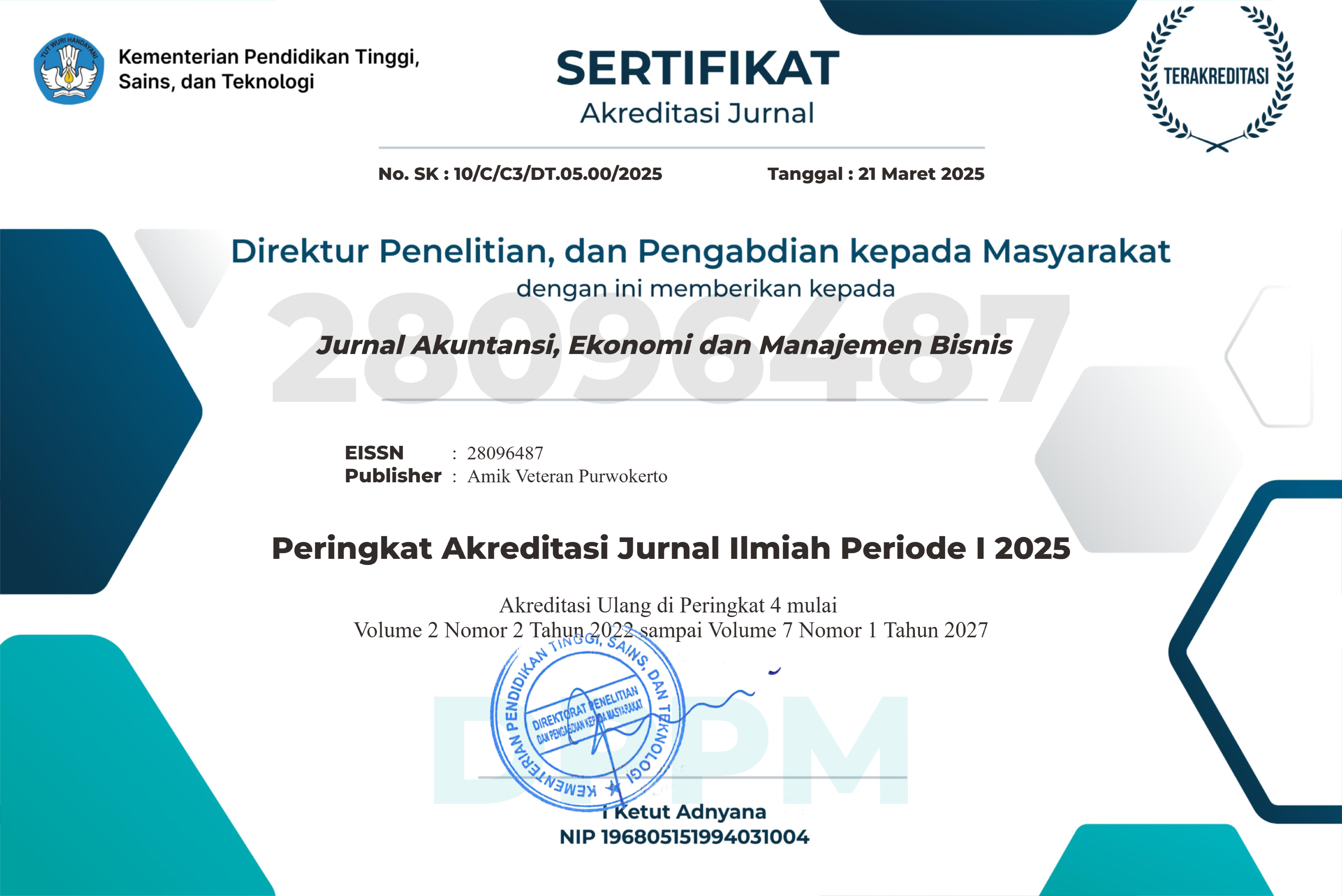Behavioral Finance in the Digital Age: How Social Media Influences Investment Decisions
DOI:
https://doi.org/10.55606/jaemb.v5i1.6519Keywords:
behavioral finance, social media, investor bias, financial influencers, sentiment analysisAbstract
Retail investors today are heavily influenced by platforms like Reddit, TikTok, Twitter, and YouTube, where financial decisions are increasingly shaped by viral memes, influencer opinions, and emotionally charged content rather than company fundamentals or analytical research. Events such as the GameStop short squeeze and cryptocurrency pump-and-dump schemes illustrate how online communities can coordinate mass trading behavior, often driven by hype and group sentiment. This study examines how social media fuels behavioral biases like overconfidence, confirmation bias, and herding, while also enabling emotional contagion during market uncertainty—seen clearly during the COVID-19 crash. It explores how sentiment analysis models attempt to predict market movements using language data from posts and tweets, yet often fail to distinguish between authentic sentiment and manipulated signals generated by bots or coordinated campaigns. Influencers without financial credentials regularly offer investment “tips” that go viral, drawing millions of views but little regulatory oversight. These patterns show that behavioral finance must evolve to account for real-time, crowd-based, platform-driven investor behavior. Future work should compare platform-specific features—such as Reddit’s upvote dynamics vs. TikTok’s algorithmic exposure—and assess how misinformation, social validation, and low financial literacy combine to distort market behavior at scale.
References
N. Barberis, “Psychology-Based Models of Asset Prices and Trading Volume,” Handb. Behav. Econ. Appl. Found., vol. 1, 2, pp. 79–175, 2018, doi: 10.1016/bs.hesbe.2018.07.001
M. Statman, Behavioral finance: The second generation. CFA Institute Research Foundation, 2019.
H. K. Baker and V. Ricciardi, Investor behavior: The psychology of financial planning and investing. Wiley, 2015.
J. R. Nofsinger, The psychology of investing, 6th ed. Routledge, 2020.
A. Gupta, S. Vishwakarma, and S. Mukherjee, “Impact of social media sentiment on investor behavior and stock market volatility: Evidence from Twitter,” Int. J. Inf. Manage., vol. 63, p. 102435, 2022, doi: 10.1016/j.ijinfomgt.2021.102435.
A. Raghunandan and S. Rajgopal, “Do retail investors value sustainability? Evidence from Robinhood,” Rev. Account. Stud., vol. 26, pp. 1376–1423, 2021, doi: 10.1007/s11142-021-09611-1.
J. Liew and T. Budavári, “Investing in the era of Reddit and Robinhood: A framework for social media-driven trading,” J. Behav. Exp. Financ., vol. 31, p. 100577, 2021, doi: 10.1016/j.jbef.2021.100577.
S. Talpade and M. Talpade, “Herding and hype: Financial influencers and the digital investor,” J. Financ. Plan. Anal., vol. 15, no. 1, pp. 45–59, 2023, doi: 10.1080/09538259.2023.2175112.
A. Siganos, E. Vagenas-Nanos, and P. Verwijmeren, “Facebook’s daily sentiment and international stock markets,” J. Econ. Behav. Organ., vol. 176, pp. 127–139, 2020, doi: 10.1016/j.jebo.2020.04.012.
J. Zhang and H. Wen, “Predicting stock trends with multi-source sentiment analysis: A deep learning approach,” Decis. Support Syst., vol. 162, p. 113840, 2023, doi: 10.1016/j.dss.2022.113840.
D. Kahneman and A. Tversky, “Prospect theory: An analysis of decision under risk,” Econometrica, vol. 47, no. 2, pp. 263–292, 1979, doi: 10.2307/1914185.
B. M. Barber and T. Odean, “Boys will be boys: Gender, overconfidence, and common stock investment,” Q. J. Econ., vol. 116, no. 1, pp. 261–292, 2001, doi: 10.1162/003355301556400.
K. Daniel and D. Hirshleifer, “Overconfident investors, predictable returns, and excessive trading,” J. Econ. Perspect., vol. 29, no. 4, pp. 61–88, 2018, doi: 10.1257/jep.29.4.61.
W. Cheng, M. Luo, and X. Zhu, “Algorithmic echo chambers and investor decision-making,” J. Behav. Financ., vol. 24, no. 1, pp. 20–37, 2023, doi: 10.1080/15427560.2022.2134567.
L. A. Smales, “The role of Reddit in financial markets: Investor sentiment and retail trading,” Financ. Res. Lett., vol. 39, p. 101679, 2021, doi: 10.1016/j.frl.2020.101679.
R. Prasad, R. Menon, and A. Singh, “Information asymmetry and trust in financial influencers: A study of Gen Z investors,” Electron. Mark., vol. 33, pp. 467–482, 2023, doi: 10.1007/s12525-022-00599-7.
T. K. Fong, C. W. Kwok, and M. Wong, “Herd behavior in social media-based stock investing: Evidence from Reddit forums,” J. Behav. Financ., vol. 22, no. 4, pp. 287–300, 2021, doi: 10.1080/15427560.2021.1888762.
Y. Chen and P. De, “Investor sentiment from social media and stock return predictability: A machine learning approach,” Inf. Syst. Res., vol. 33, no. 2, pp. 499–517, 2022, doi: 10.1287/isre.2021.1075.
N. Oliveira, M. C. Cortez, and N. Areal, “Sentiment analysis using social media data for predicting stock market returns: A review,” Expert Syst. Appl., vol. 183, p. 115437, 2021, doi: 10.1016/j.eswa.2021.115437.
Y. Li, Z. Zhao, and Q. Zhou, “Can AI read the markets? Social media sentiment analysis and financial forecasting,” Decis. Support Syst., vol. 169, p. 113844, 2023, doi: 10.1016/j.dss.2023.113844.
L. Zhou, Y. Wang, and E. Ngai, “Financial influencers and digital investment behavior: The role of trust and perceived credibility,” Electron. Mark., vol. 33, pp. 255–269, 2023, doi: 10.1007/s12525-022-00551-9.
X. Luo, J. Zhang, and W. Duan, “Social media and panic selling: Evidence from investor reactions during COVID-19,” J. Mark. Res., vol. 56, no. 6, pp. 1039–1057, 2019, doi: 10.1177/0022243719869930.
S. Baker, N. Bloom, S. Davis, and S. Terry, “COVID-induced economic uncertainty,” Natl. Bur. Econ. Res., no. April, p. 17, 2020, doi: 10.3386/w26983.
S. Kumar and R. Singh, “The impact of social media education on retail investor decision-making,” J. Financ. Serv. Mark., vol. 26, pp. 168–184, 2021, doi: 10.1057/s41264-021-00092-2.
A. Hung, K. Mihaly, and J. Yoong, “Financial literacy and investor decision-making in the digital era,” J. Pension Econ. Financ., vol. 19, no. 4, pp. 560–581, 2020, doi: 10.1017/S1474747219000068.
M. Fernandes, D. Almeida, and R. Costa, “Financial education and digital behavior: Insights from TikTok users,” J. Econ. Psychol., vol. 88, p. 102472, 2022, doi: 10.1016/j.joep.2021.102472.
C. Espinosa-Méndez, D. Arias, and G. Vázquez, “Social media-driven herding in stock markets,” Financ. Res. Lett., vol. 45, p. 102384, 2022, doi: 10.1016/j.frl.2021.102384.
M. Eisen and T. Komarek, “The rise of financial influencers: Regulation, risk, and reward,” J. Financ. Regul. Compliance, vol. 30, no. 2, pp. 173–187, 2022, doi: 10.1108/JFRC-01-2022-0010.
Downloads
Published
How to Cite
Issue
Section
License
Copyright (c) 2025 Jurnal Akuntansi, Ekonomi dan Manajemen Bisnis

This work is licensed under a Creative Commons Attribution-ShareAlike 4.0 International License.








